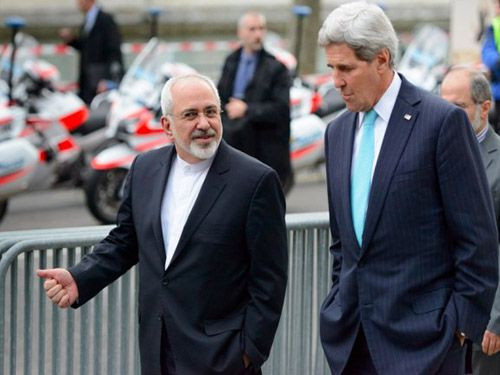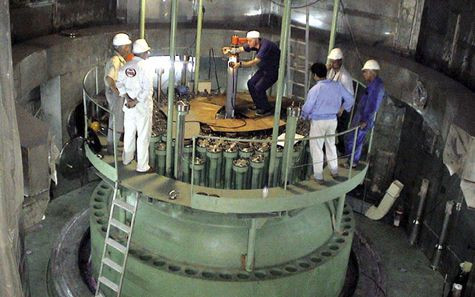US Secretary of State John Kerry: Will it "thaw" US-Iran relations?
(Baonghean) - The US Secretary of State left Washington on March 25 to travel to Lausanne, Switzerland, to negotiate a framework agreement between Iran and the P5+1 group before the March 31 deadline and towards a final agreement in June.
With the pressure of both time and the two houses of Congress coming to this final round of negotiations, with his experience and ingenuity, will Mr. John Kerry be able to "thaw" the diplomatic relationship that was severed after Iranian protesters seized the US embassy in Tehran in 1979?
 |
| US Secretary of State John Kerry (right) and his Iranian counterpart Mohammad Javad Zarif on the sidelines of a negotiation. Photo from the internet |
John Kerry was born on December 11, 1943, at Fitzsimmons Army Hospital in Aurora, Colorado. He attended boarding schools in Massachusetts and New Hampshire, then studied political science at Yale University, class of 1966. He enlisted in the Naval Reserve in 1966, serving as a commissioned officer on a PCF patrol boat in Vietnam for four months from 1968 to 1969. Returning to the United States, John Kerry joined the Vietnam Veterans Against the War as a nationally recognized spokesman in the United States. He appeared before the House Foreign Affairs Committee, where he considered US policy in Vietnam to be the cause of "war crimes".
After graduating from Boston Law School, Kerry worked as a District Attorney and co-founded a private firm. He served as Lieutenant Governor of Massachusetts under Michael Dukakis from 1983 to 1985. Since May 2012, Mr. Kerry has also been one of five US Senators who have voiced concerns about the threat to freedom of navigation when China and ASEAN have failed to find an effective communication channel and emphasized the importance of UNCLOS in resolving sovereignty disputes in the East Sea. On January 29, 2013, the US Senate approved him as US Secretary of State with 94 votes in favor and 3 votes against after being chosen by President Barack Obama to replace Mrs. Hillary Clinton. He took office on February 1, 2013. Since taking office, the familiar image he has left is that of a Secretary of State with a gentle face, marked by austerity. He regularly appears at military and diplomatic hotspots around the world, and his statements are largely constructive.
Relations between the US and Iran have been frozen since the November 4, 1979, incident by a group of Iranian students. The students were the leaders in overthrowing the US-backed Shah Mohammad Reza Pahlavi in the Islamic Revolution. The Shah was seriously ill and sought refuge abroad. Exiled cleric Ayatollah Ruhollah Khomeini returned to Iran in the triumph of the Islamic Revolution, with a hardline anti-American stance expressed in the mantra "Down with America". Student activists coordinated with radical clerics to storm the US embassy, kidnapping 90 hostages. 52 people were held for 444 days, demanding the extradition of the ousted Shah from the US to Iran. The arrest forced US President Jimmy Carter at the time to freeze Iranian assets and cut all diplomatic relations with Tehran. The hostages were only released when Ronald Reagan took office as President, replacing Jimmy Carter. Since then, the relationship between the two countries has deteriorated due to Iran's determination to pursue and achieve many nuclear achievements both civilian and defense.
Returning to the issue of nuclear negotiations between Iran and the P5+1 group (the 5 permanent members of the UN Security Council and Germany), until the final round of negotiations to seek a framework agreement before the deadline of December 31, towards a final agreement in June. Since John Kerry represented the US and was also the country with the most important voice on the agenda of all negotiations, the parties have achieved very positive and more constructive results than confrontation. Especially in the round of negotiations that was postponed on March 20 because the Iranian delegation had to return home to attend the funeral of President Hassan Rowhani's mother. Although it had to stop halfway, after 6 days and nights of intense negotiations, Iran and the P5+1 group along with Germany have preliminarily agreed to allow Iran to keep 6,000 of the more than 10,000 existing nuclear fuel rods, instead of 6,500 as previously planned.
These fuel rods will be refined to reduce the uranium content to a level that cannot be used to make a nuclear bomb. This is considered a breakthrough in the negotiation process on Iran's nuclear program. Previously, the US insisted that Iran only keep 500 - 1,500 or a maximum of 4,000 nuclear fuel rods; the remaining fuel rods will be shipped abroad. In return, Iran must suspend all nuclear activities, US officials said at least for 10 years, but it could last 15 or even 20 years. In addition, the US and other countries will soon gradually lift the economic blockade measures against Iran. Within his authority, US President Barack Obama does not need to go through Congress, he can decide to loosen some economic sanctions. The United Nations will also partially lift the embargo on conventional weapons against Iran.
 |
| Iran's nuclear facility. Photo: UN |
According to experts, the above results between Iran and the P5+1 group are expected to open up hope for the parties to reach a framework agreement before the end of March and a comprehensive detailed agreement before the end of June. Ms. Cameli Entekhabifard, an international event analyst, said: "The results achieved will contribute to boosting Iran's economy, reducing pressure on the Iranian government. Thereby, Iran has the opportunity to solve other regional problems such as Syria and Iraq. Meanwhile, US Secretary of State John Kerry also highly appreciated the results of the 6 days of negotiations: "We had positive, directional negotiations. We have made positive progress. We will return here next week."
So, on the agenda, all sides have shown goodwill and constructiveness before the new round of negotiations. But Secretary of State John Kerry's trip this time, in addition to the time pressure, also takes place in the context of the US Congress, both the House of Representatives and the Senate, having issued open letters demanding the White House give lawmakers a greater say in any deal with Iran. Another pressure on Mr. Kerry is that both the US Senate and the House of Representatives have plans to vote on a new bill related to Iran. This is clearly a battle between the ruling Democratic Party and the Republican-controlled Congress.
Therefore, experts believe that if a final comprehensive agreement on Iran's nuclear program is reached by the deadline of June 31, it will become the most important foreign policy milestone in the remaining two years of President Barack Obama's term. This will also give the Democratic Party an advantage in the next US presidential election when Mr. Obama leaves the White House, because most American voters are tired of the US's confrontation and "overly enthusiastic" involvement in matters outside the country's territory. It will also become a "victory" for veteran politician and diplomat John Kerry. This will also open a new chapter in the diplomatic relations that have been frozen since 1979 between these two nuclear powers.
Southern Scenery






